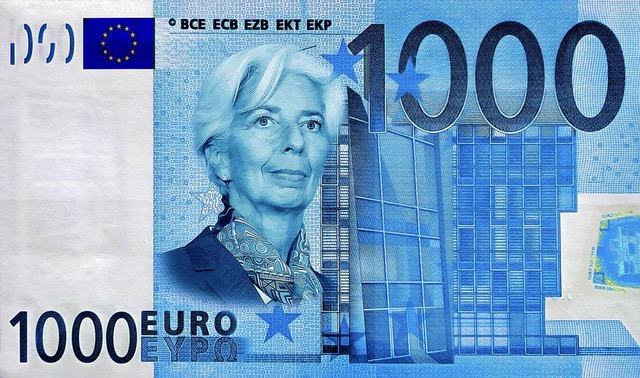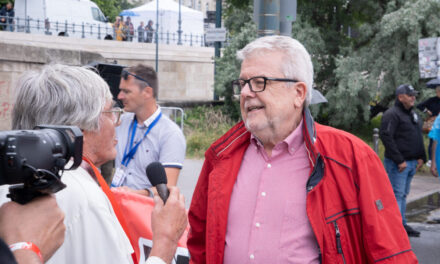How long will there be euros? As long as the Germans, Austrians and Dutch can finance it! The bad news is that net contributors have now really reached their pain point.
The euro is a "defective product" that should have been as strong an international currency as the German mark. That is why the European Central Bank (ECB) was modeled after the Bundesbank. Then the cabbage was entrusted to the goat, i.e. central bank presidents from the indebted and unwilling to structural reforms from southern countries, who did not finance the long-delayed pension, social and labor market reforms of the southern member countries with accelerated bond purchases, but the southerners' purchase of German cars and Dutch food maintaining his standard of living without restrictions. Another part of the money given to southern countries migrated "back" to the north in the form of interest.
After the 2008 financial crisis, the French Jean-Claude Trichet was only a cautious "fiscal alcoholic", which his successor Mario Draghi can no longer be accused of. In his famous and infamous speech (July 27, 2015), "Super Mario" declared that "within the mandate of the ECB preserve the euro, whatever it takes " . Christine Lagarde awkwardly avoids this phrase, but in her actions she follows the example of her predecessor.
The dog is buried right here, because Article 125 of the Lisbon Treaty prohibits EU budget financing of member states, which the ECB defends with the argument that they only buy government and other (e.g. corporate) bonds on the secondary market. the German Federal Constitutional Court in May 2020, the Court of Justice of the EU stated that it does not examine this transparent argument of the ECB on its merits and does not put an end to it, which undermines the budgetary sovereignty of the member states of the eurozone, including the Bundestag.
In addition to the accusation of ultra vires, the decision also criticizes the fact that the ECB does not buy bonds according to its mandate in accordance with the weight of the eurozone countries in euros, but in the case of the indebted countries of the south far more. In the justification, it was also stated that the money coming from the purchase of bonds was absorbed by the financial intermediary system, which blew up the stock market and real estate, catapulting the price of real estate and rents in big cities to heights unreachable for the average person.
Where are we now? they rightfully ask after that. In order to understand the situation and the future of the common currency, we need to keep two fundamental connections in mind. Both are linked to Angela Merkel's chancellorship: without Italy there is no euro, and without the euro there is no European integration! The other factor is the "Black Zero" (Schwarze Null), i.e. the abandonment of the disciplined German budget policy to deal with the economic consequences of the Covid epidemic.
In March 2020, it seemed that the member countries would have to deal with the economic effects of the epidemic themselves, so the interest rate on Italian government bonds jumped 3 percent above the German one. The ECB immediately launched another bond purchase program (PEPP), further rolling the snowball, which now reaches 9,000 billion euros, which is 85 percent of the GDP of the eurozone. 40 percent of the euro zone's government securities are already in the ECB's safe.
The situation was also critical due to the energy inflation that had already started before the war, which only got worse due to increased demand and shrinking demand due to nuclear and coal power plants that stopped the Green Revolution, and renewable power plants that underperformed in winter and autumn. EU energy sanctions and extremely expensive LNG only make the situation worse. With expensive energy, other products (food) can be produced and transported more expensively, which leads to further price increases.
The American FED and the MNB have already raised interest rates, while the ECB only wants to raise it by 0.25 percent in July, which is mostly a joke, given the inflation rate above 8%, which has not been seen in forty years. A larger interest rate hike would make it more expensive to refinance the debt of the southern countries, so as a Solomonic decision, "they will not start a new program, but refinance the expiring debt", that is, they will keep the bond purchases at the gigantic level that they have so far inflated.
The ECB therefore runs ahead, i.e. it prints even more money, which creates an artificial demand for the government bonds of the southern eurozone countries, thus reducing their interest rates. Since market investors only buy at higher interest rates when they see galloping inflation, or wait for it, the ECB will be forced to print even more money, which could even lead to hyperinflation.
Here we come to the two cited factors. There will be an election in Italy next year, the structural reforms would mostly favor the Eurorealist alliance of Matteo Salvini and Georga Meloni, so the reforms will continue to slip, and the banking press will continue to spin. The ferry is paid for by the Germans, who had to give up the balanced budget policy of the Black Zero in order to finance the euro and the money they have already burned to save it. The magnitude of this is shown by the fact that the Bundesbank's Target 2 claims are now over one thousand billion euros. The ten-year German government bond traded at a negative interest rate for a long time, but due to the deterioration of the euro's situation outlined above, it has already reached the 1-1.5% range.
What does all this mean for us, Hungarians who pay with forints? The Hungarian economy is tied to the German economy and the Eurozone by a thousand threads, but the national currency has the means of economic sovereignty (central bank interest rate hike or devaluation), which e.g. Slovakia doesn't have one. The magnitude of the rounding error of Croatia joining the euro is rather symbolic.
In Brussels and the capitals of the Eurozone, they chose a different direction. After the Italian election, it will be decided which currency will replace the current euro banknotes that will be replaced in 2024 Some say there will be a northern and a southern euro. From the Hungarian point of view, it would be best if, in order to save the euro as we currently know it, Brussels and the southern eurozone member countries would return to responsible budget policy, as Hungary is doing - precisely because of the preservation of economic sovereignty and room for maneuver.
Source and photo: mozgasterblog.hu













